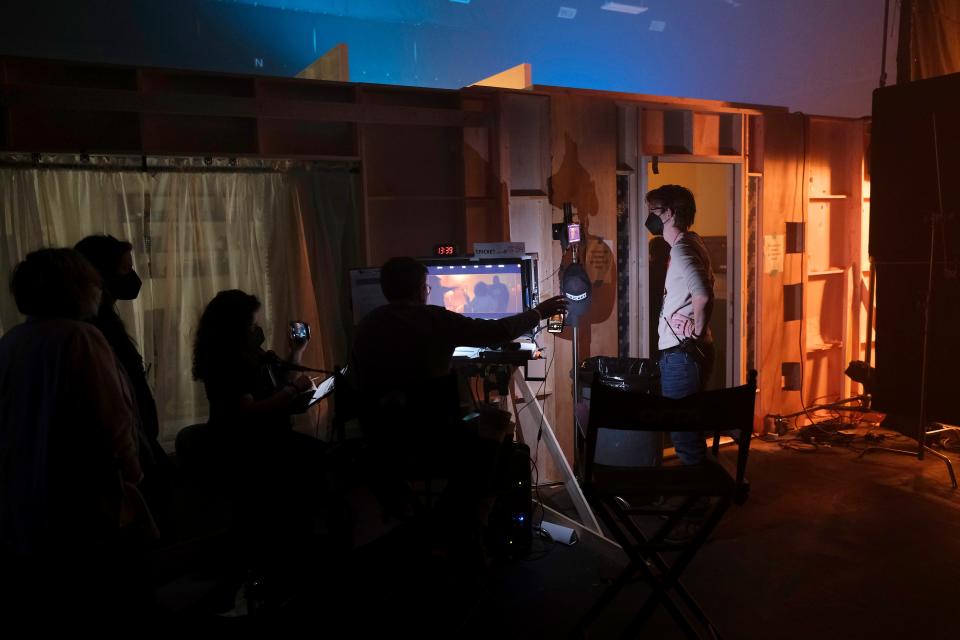Are red states like Oklahoma bad for business? California thinks so.

- Oops!Something went wrong.Please try again later.
Gov. Kevin Stitt is a regular critic of Democratically controlled states and has often called on their businesses to move to Oklahoma in search of freer pastures.
Last week he met his liberal match as California Gov. Gavin Newsom called on film production companies to abandon states like Oklahoma because of its anti-LGBTQ laws and restrictions on abortion rights.
“Over the past several years, the legislature of states like Georgia and Oklahoma have waged a cruel assault on essential rights,” Newsom said in an advertisement printed last week in Variety.
“So to those in power to make decisions about where to film, where to hire, where to open new offices, we in California say: Walk the walk.”
Stitt laughed off the criticism, joking that Newsom was Oklahoma’s “economic developer of the year” because he had driven so much business to Oklahoma through his own state’s high cost of living and shut down policies during the pandemic.
More: Ousted Oklahoma veterans commissioners sue Gov. Kevin Stitt over removal
The governor's communication director took to Twitter to say, “Gov. Newsom should spend less time attacking red states and more addressing California's out-of-control energy costs, endless violent crime, people shooting up drugs in the streets, chronic homelessness, gridlock traffic, and rolling blackouts.”
'There is a huge difference between Oklahoma City and Oklahoma'
States have long competed with each other for business, often dangling out tax breaks and other financial incentives.
But now states are using political ideology as a way to bring in new industries.
"There has never been a bigger difference between a red state and a blue state," Stitt said this year during his State of the State address.
Some businesses agree.
Major League Baseball pulled its annual All-Star game from Atlanta last year after the state passed restrictive voting laws, while other major corporations, including Delta Air Lines, also criticized the new restrictions.
Businesses might also have a tougher time getting workers to relocate as the real estate firm Redfin found that 1 in 10 recent movers surveyed said they would refuse to live in a place where abortion isn't fully legal, and nearly half of recent movers said they prefer to live where there are broad anti-discrimination laws related to gender and sexual orientation.
"Now that workers have more control over where they live, more people will seek out areas where there are like-minded people with laws that fit their political beliefs," Redfin wrote in its annual prediction about the real estate market.
Businesses often try to stay out of political debates and appeal to the largest cross-section of customers possible, which often means showing support for LGBTQ rights as the general population at large is mostly in agreement, even if the actual voting population is more divided.
After the U.S. Supreme Court overturned Roe v. Wade and conservative states like Oklahoma enacted near-total bans on abortion, businesses are being pressured to not support those economies. The state's ban on transgender women from competing in sports and efforts to restrict gender-affirming health care have also caused some events and businesses to openly reconsider Oklahoma.
More: What legislators did instead of funding voter-approved criminal justice reforms
But Oklahoma City Mayor David Holt believes businesses more often choose cities rather than states.
“There is a huge difference between Oklahoma City and Oklahoma,” Holt told The Oklahoman. “We are a place that officially celebrates Pride and Indigenous Peoples' Day, we welcome immigrants, and recently created a human rights commission.
“We are extremely inclusive and I think it would be very unfortunate for people to make decisions about Oklahoma City based on their opinion of Oklahoma, just like I’m sure Gov. Newsom wouldn’t want people to make decisions about California because it’s located in a country that has overturned Roe. v. Wade.”
While California is trying to lure back the film industry, promoting itself as an inclusive environment with liberal values, Oklahoma has tried to attract businesses with a more conservative viewpoint, including efforts to attract gun manufacturers.
Oklahoma has also tried to make it harder for businesses that take political positions on climate change, including a bill passed this year that would prevent the state from entering into a contract with a company that boycotts fossil fuel companies.
Did politics cost Oklahoma the Panasonic factory?
Oklahoma officials recently thought they were in the lead to attract a new Panasonic electric car battery factory that ultimately chose Kansas, another “red state,” but one with a Democratic governor and where residents recently voted in favor of abortion rights.
House Minority Leader Emily Virgin immediately thought politics were at play.
"We were told back in April that Panasonic was most likely coming to Oklahoma. You have to wonder if the OK GOP doubling down on extreme anti-choice and anti-LGBTQ legislation between then and now made a difference," Virgin, D-Norman, tweeted when news broke that the company had selected Kansas.
We were told back in April that Panasonic was most likely coming to Oklahoma. You have to wonder if the OK GOP doubling down on extreme anti-choice & anti-LGBTQ legislation between then and now made a difference. https://t.co/6RJDXGYPe8
— Emily Virgin (@EmilyVirginOK) July 13, 2022
Rep. Forrest Bennett, D-Oklahoma City, is convinced Oklahoma's political rhetoric cost it the Panasonic factory.
"There is so much we have in common with Kansas, but one of the big areas of difference is what is happening with their government," Bennett said.
Bennett referenced laws and lawmaker comments in Oklahoma that are anti-transgender, and the fact that Panasonic has donated money to the Trevor Project, an organization that supports suicide prevention efforts among lesbian, gay, bisexual, transgender, queer and questioning youth.
Monkeypox is now a national emergency. What to know about vaccines in Oklahoma
"When you really make it clear that your priorities are to say hateful things and participate as much as you can in the national clown show instead of putting your head down and finding solutions to Oklahoma's problems, this is what you get," Bennett said.
Nicole McAfee, executive director of Freedom Oklahoma, said she has "mixed feelings" about businesses avoiding Oklahoma because of its anti-LGBTQ policies.
"It brings a feeling of solidarity but it is also a loss of jobs that could affect LGBTQ+ people, as well," McAfee said.
Businesses look at financial benefits and quality of life factors

While politics might be a factor, businesses also look at the local workforce and tax breaks.
Oklahoma has used both to become one of the leading states for film production, which created more than 11,000 jobs in 2021, according to the Oklahoma Film + Music Office.
Oklahoma’s film industry really seemed to take off during the pandemic, as Stitt deemed film companies an essential business, and state incentives were increased. Film studios have opened, local schools have increased their training in film studies, and major movie and television productions have made Oklahoma their base of operations.
More: Gov. Kevin Stitt signs new Oklahoma film incentive bill into law
"Overall, I believe COVID has changed the landscape of Oklahoma’s film industry but for the better because our people and communities united and chose to find solutions during such uncertain times," Oklahoma Film + Music Office Director Tava Maloy Sofsky told The Oklahoman earlier this year.
But even if the film industry and other businesses aren't going to make decisions based on culture war politics, Bennett, the Democratic lawmaker from Oklahoma City, said state leaders should still focus more on improving education and health care, rather than promote laws that might be politically popular to the Republican base.
"I do still think Oklahoma can be an attractive place for business because of our affordability, and the fact that Oklahoma City and Tulsa offer things that young people want," Bennett said.
"But I can't imagine that there are many businesses that look at Oklahoma right now and say, 'Yep, that’s a government that's committed to doing what's best for all people.'"
This article originally appeared on Oklahoman: California's governor calls for film companies to leave Oklahoma

